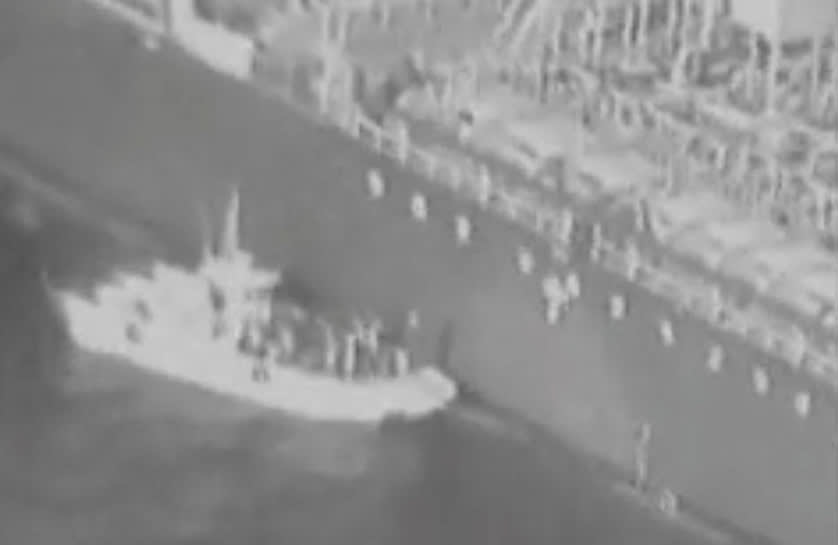Middle East analysts see Iran's fingerprints on tanker attacks — but slim chance of war - 5 minutes read

The attacks on a pair of tankers in the Gulf of Oman are likely the work of Iran, according to several analysts.
The view among some Middle East watchers aligns with the conclusion presented by the Trump administration, which on Thursday blamed Iran for the suspected strikes.
"This assessment is based on intelligence, the weapons used, the level of expertise needed to execute the operation, recent similar Iranian attacks on shipping and the fact that no proxy group operating in the area has the resources and proficiency to act with such a high degree of sophistication," Secretary of State Mike Pompeo said Thursday.
The determination marks the latest escalation between the Iranian leadership in Tehran and the Trump administration, which has sanctioned Iran and vowed to respond to attacks against U.S. interests and allies with "unrelenting force."
Despite those vows, few analysts think Thursday's incidents put the U.S. and Iran on a glide path to war — though some warn the adversaries could find themselves hurtling toward conflict.
"From the Iranian government standpoint, the U.S. sanctions are designed to cause their economy to collapse and to elicit regime change," Helima Croft, global head of commodity strategy at RBC Capital Markets, told CNBC's "Power Lunch" on Thursday.
"Now we say we don't want a war, but there are actors in Iran — I would say in the Revolutionary Guard — who are willing to push the region into the brink of one in order to get the United States and our regional allies to reconsider the current course of action."
Overnight Thursday, explosions rocked a pair of tankers transiting the Gulf of Oman off the coast of Iran, leaving one in flames and both adrift. The incident came just one month after four tankers were sabotaged in the port of Fujairah in the United Arab Emirates.
The attacks last month followed the Trump administration's decision to tighten sanctions on Iran in a bid to cut its oil exports to zero. President Donald Trump restored the sanctions last year after unilaterally withdrawing the U.S. from a 2015 nuclear accord between Iran and world powers.
Iranian Foreign Minister Javad Zarif on Thursday tweeted, "Suspicious doesn't begin to describe what likely transpired this morning." He noted that Iran was holding talks with Japanese Prime Minister Shinzo Abe when the attacks on the vessels, both with links to Japan, occurred.
At least some analysts believe there is some credibility to Iran's denials.
"It doesn't really benefit Iran to mess up the transiting of the Strait of Hormuz and the oil flows ... because they're going to alienate whatever supporters they had out there in the European Union, Asian customers that have been trying to work with Iran," John Kilduff, founding partner at energy hedge fund Again Capital, told CNBC's "Squawk Box."
"To the extent you have forces out there that want to topple the Iranian regime, or actors, it benefits them," he said. "It gets this game on. It gets the U.S. potentially to such a state of ire that we attack — and it gets the Saudis what they want, which is an attack on Iran."
Others say Iran is the most likely culprit.
"Denials notwithstanding, the attacks fit squarely within Iranian capabilities and motivations," Eurasia Group said in a briefing Thursday.
Analysts at the risk consultancy say Iran's Islamic Revolutionary Guard Corps — an elite military unit loyal to Supreme Leader Ayatollah Khamenei — has for decades launched similar attacks to undermine elected leaders. Thursday's strikes may have been engineered to underscore the risk to global oil supplies during Abe's visit, they say.
"Indeed, combined with the four incidents in Fujairah, today's attacks appear to be part of a systematic Iranian effort to demonstrate that peace and security in the Gulf is contingent on its own economic stability," Eurasia Group said.
Paul Sheldon, chief geopolitical advisor at S&P Global Platts Analytics, also says it would unsurprising if Iran were involved, either directly or indirectly.
"The details remain unclear at the time of writing, but the attacks fit Iran's recent pattern of reacting to tightening U.S. sanctions," he said.
The tankers Front Altair and Kokuka Courageous movements are shown in this still image taken from an animation obtained June 13, 2019 from social media.
Marin Traffic via Reuters
Sheldon expects Iran to continue launching attacks on U.S. interests and allies through proxies but says those actions likely won't be severe enough to elicit a military response.
"Iran fears U.S. military action after witnessing the Iraq invasions of 1991 and 2003, while President Trump is unlikely to react militarily to any provocation short of an attack on U.S. troops or facilities," he said.
Eurasia Group says Thursday's events put upward pressure on the chances of military conflict, but it believes the probability of war sits at about 30%.
Yet Eurasia Group says the recent attacks are eroding U.S. deterrence in the Persian Gulf. U.S. allies in Saudi Arabia and UAE will see them as a test of America's commitment, and the attacks put pressure on administration hawks like national security advisor John Bolton to make good on threats.
Other analysts also see Thursday's attacks as a sign that the Trump administration's "maximum pressure" campaign against Iran is painting Washington into a corner.
"If Iran is behind these attacks, it clearly shows that a U.S. policy relying solely on coercion can backfire," said Ali Vaez, Iran Project director for the International Crisis Group.
"Diplomatic efforts by allies are necessary to dial down the tension, but they can't resolve it as long as Washington relies on an all-or-nothing approach."